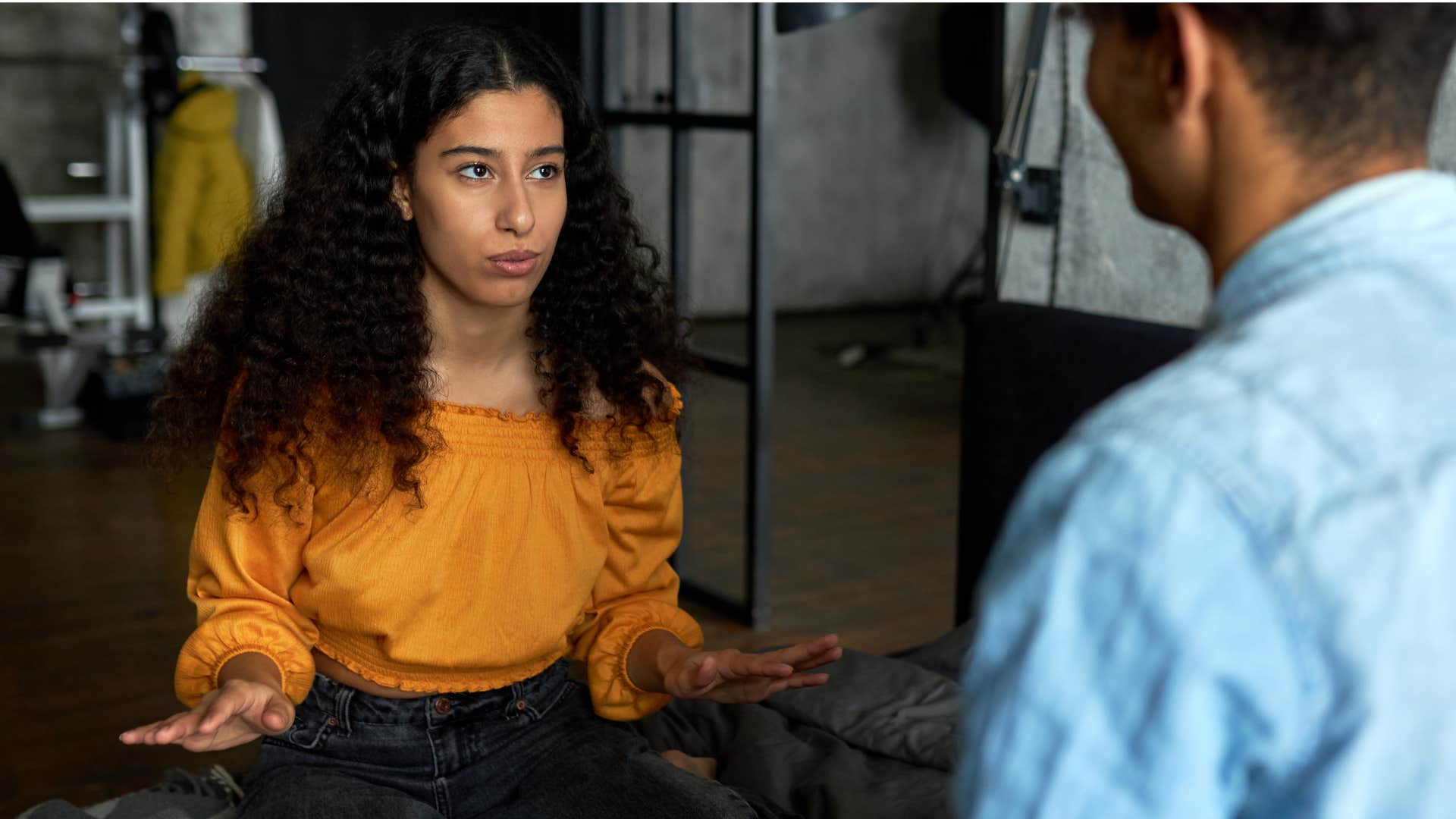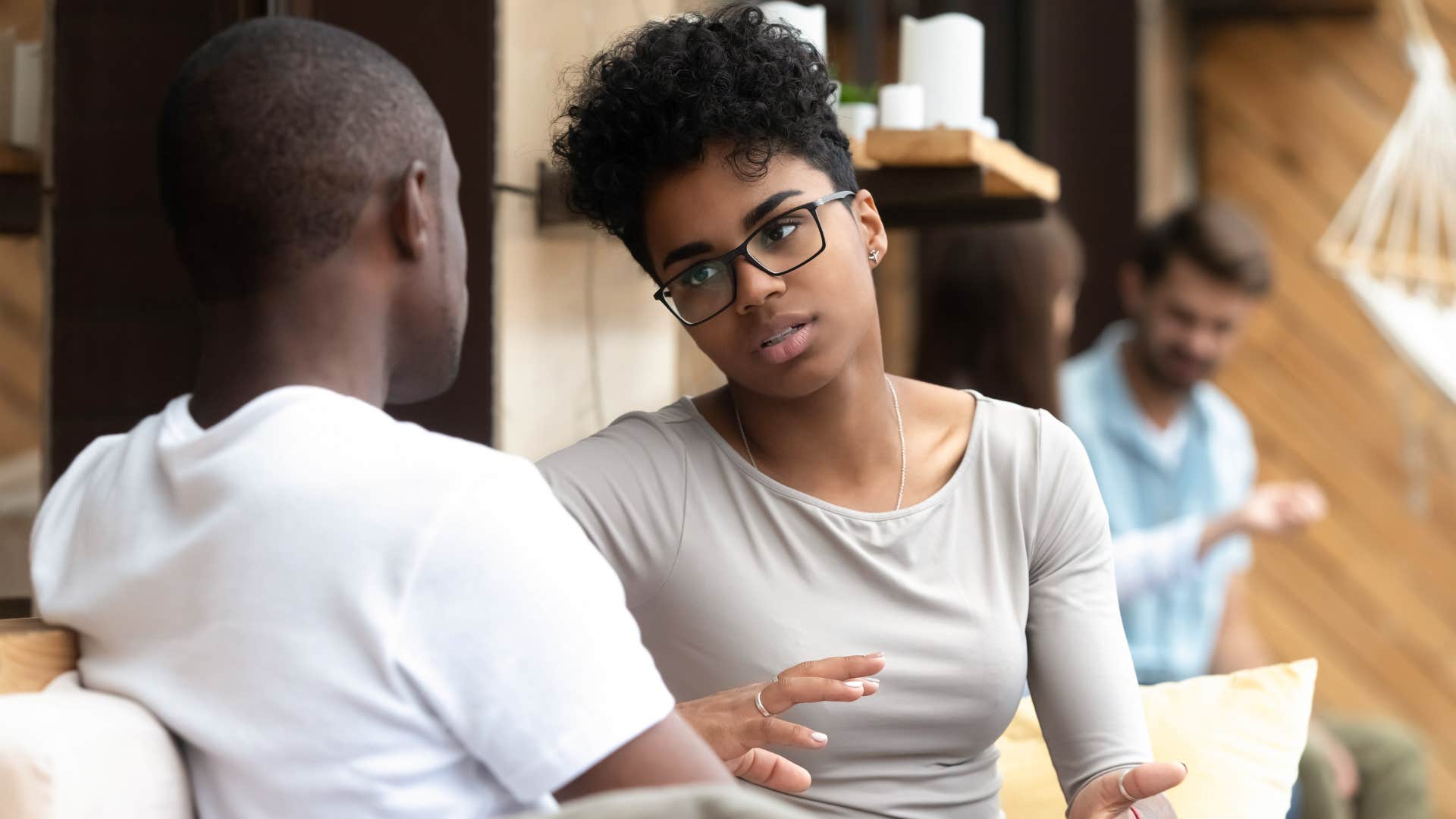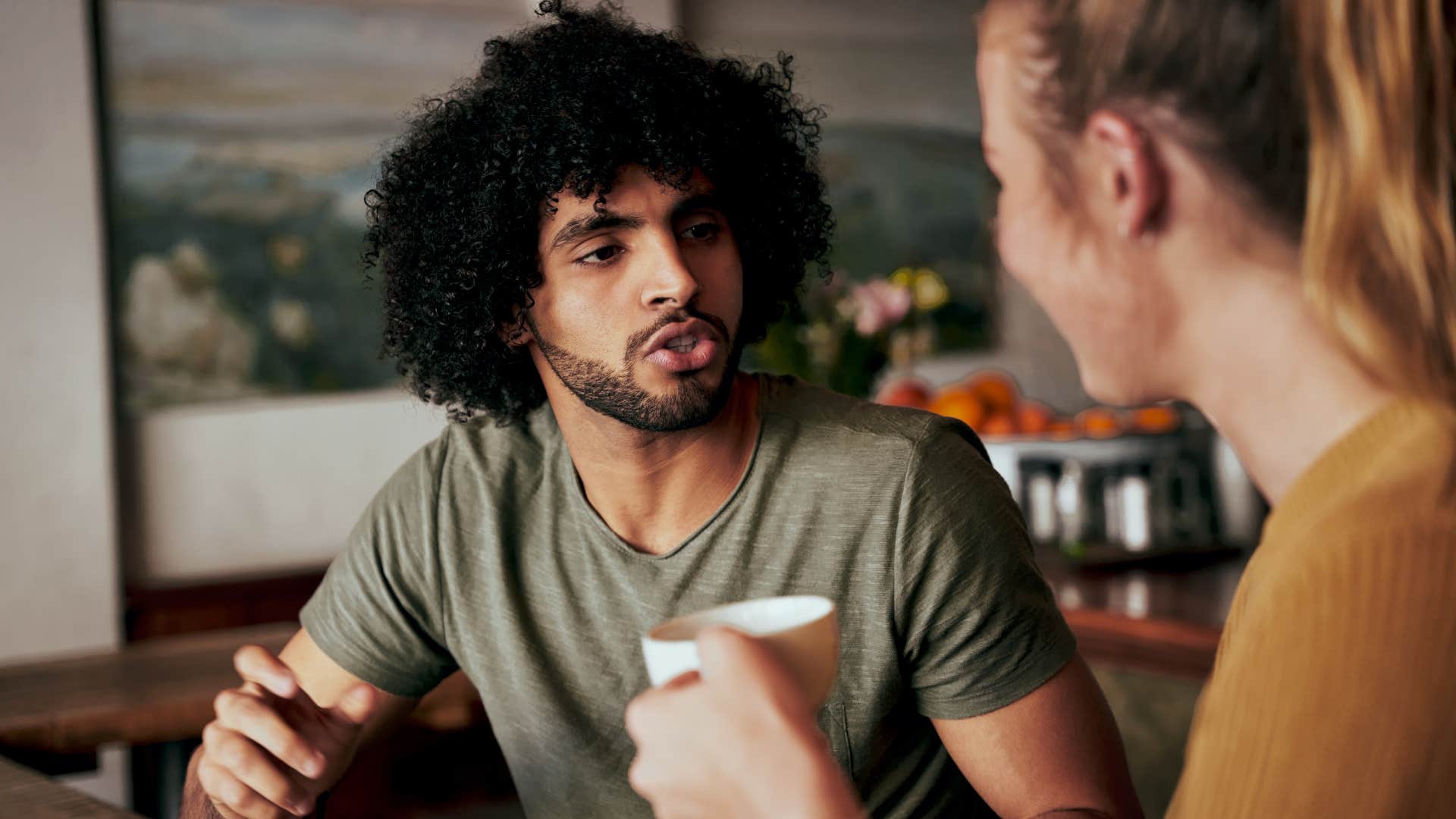11 Brilliant Questions Selectively Social People Ask Before Agreeing To Plans
Don't say 'yes' until you know what you're getting yourself into.
 vision-photo | Shutterstock
vision-photo | Shutterstock Most people have been in that awkward predicament before: they're with a loved one or a coworker when the person asks for the unthinkable: a questionable favor. While most people are eager to jump into the situation and readily agree out of necessity and people-pleasing tendencies, others ask brilliant questions.
Known as selectively social people, these individuals are careful about who they hang out with. From whom they spend time with to whom they give their energy, these people actively do their best to choose quality over quantity. This is probably why there are smart questions that socially aware people ask before agreeing to any plans that others might not consider. From digging deep into their own needs to figuring out how these plans will impact them, people who are selectively social are brilliant at determining what is and isn't worth their time.
11 brilliant questions that selectively social people ask before agreeing to plans:
1. 'How long is the event going to be?'
 Anatoliy Karlyuk | Shutterstock
Anatoliy Karlyuk | Shutterstock
The first brilliant question that socially selective people ask before agreeing to plans is, "How long will the event last?" How many times have people agreed to a plan without asking any questions whatsoever? Although it may sound obvious, many people avoid asking these critical questions because they don't want to come across as bothersome or, worse, have people-pleasing tendencies that prevent them from uttering the word 'no'.
According to a survey from YouGov, 49% of Americans identify as people pleasers. So, rather than ask important questions, it makes sense why most people readily agree. The need to be liked tends to overrun their boundaries. That being said, selectively social people don't particularly care about being well-liked.
Since they're already selective about the company they keep, these individuals are primarily focused on one thing: how can they meet their own needs? As a result, they see no issues with asking how long the event will be. Not only will they have a better idea of what they're agreeing to, but as it stands, most people don't see an issue with answering this question in the first place. Despite what people might think, most individuals aren't so easily offended by questions such as these.
2. 'Is this something casual?'
 fizkes | Shutterstock
fizkes | Shutterstock
It can be difficult to have a question ready on the spot when someone asks for a favor or invites people out on a whim. Yet, before agreeing to go out, a brilliant question that selectively social people ask before agreeing to plans is, "Is this a casual event?"
It sounds simple, but many people forget to ask these important questions before agreeing to an outing. Perhaps it's because they didn't think much of it, or maybe it's because they assumed it would be casual automatically, but regardless, it's important to avoid misunderstandings and be thorough in communication.
It's rare, but sometimes people can miscommunicate on what the outing is actually about. A simple dinner and a show can quickly turn into a trip to an expensive restaurant because people weren't clear in their communication. According to a 2023 study, this is problematic as miscommunication not only leads to confusion but also to frustration, which, depending on the situation, can become quite sour.
Before agreeing to go, ensure that both parties are on the same page. With things getting increasingly expensive, people need to know what they're signing up for before readily agreeing.
3. 'Is it okay if I bring someone?'
 Dragana Gordic | Shutterstock
Dragana Gordic | Shutterstock
Let's be real for a second: outings can get uncomfortable. Perhaps you haven't seen someone in a while and don't feel comfortable going out with them. Or, maybe someone would feel better if they brought another friend along. While it might sound obvious, before agreeing to a plan, it's important to cover all bases.
This is why a brilliant question that selectively social people ask before agreeing to plans is, "Is it okay if I bring someone?" For some people, this might sound like a no-brainer to ask this question beforehand, but how many times has someone gone out with someone only to have an unexpected guest show up out of the blue?
If they're the average person, then they likely have found themselves in this situation once or twice, and because of this, know just how uncomfortable it can be to sit there awkwardly as two people spend most of the time chatting. Not only is this extremely awkward as they sit there alone sipping on their drink, but it's also isolating as they feel left out. This is dangerous, as the American Psychological Association cited that social rejection leads to an increase in aggression, which can lead to violence. So, always ask this question beforehand. Otherwise, they might risk unintentionally making the other person uncomfortable, or worse, angry.
4. 'How many people are going to be there?'
 Pheelings media | Shutterstock
Pheelings media | Shutterstock
Most of the time, it slips people's minds to ask the critical questions. Yet, when someone is eager to hang out and socialize, they might not think about how many people will be there, or even who they will be with. However, for selectively social people, the individuals they choose to hang out with and give their energy to are always at the forefront of their minds.
This is probably why a brilliant question to ask before agreeing to plans is, "How many people will be there?" Who people give their energy to is very important. Constantly socializing or being around a toxic group of people is the difference between thriving and failing in life.
Selectively social people understand this, and it's probably why they have very few friends. After all, they're only listening to their instincts that crave quality over quantity. According to a 2024 study, 40% wished for greater closeness in their friendships. So, while it might sound unimportant, don't be afraid to ask ahead of time. Knowing how many people will be there will help determine if being around a large group of people is something they're comfortable with or not.
5. 'What are you most looking forward to?'
 Antonio Guillem | Shutterstock
Antonio Guillem | Shutterstock
When someone doesn't want to demand something of someone, they might give up asking questions because they don't want to come off as rude. However, before they throw in the towel and effectively give up, a brilliant question that selectively social people ask before agreeing to plans is, "What are you looking forward to the most?"
It might sound out of the blue, but asking what someone is most looking forward to is a good indicator of what people can expect without having to ask it directly.
For those who are a bit shy, this is perfect, as they can avoid the anxiety that comes with asking a question. That being said, it is worth noting that most people do not honestly care. According to a 2024 study, people are less judgmental than others assume. So, while being indirect might feel better, in the long run, it doesn't truly matter for the other person.
6. 'Is it okay if I leave early?'
 Zmaster | Shutterstock
Zmaster | Shutterstock
Another brilliant question that selectively social people ask before agreeing to plans is, "Is it okay if I leave early, or would that be considered rude?" Most people might raise an eyebrow when a selectively social person asks this question. However, depending on the plans, this question can be beneficial to know.
From family reunions to work get-togethers, knowing if someone has the option to dip can help them decide whether to attend in the first place. After all, nobody wants to do something rude and risk accidentally ruining their reputation.
According to a study published in Social Cognition, it's much harder to come back from a bad first impression than a good first impression. So, while it might seem unnecessary, knowing this ahead of time is the difference between looking good in front of important people versus falling from their good graces, without even getting to know them much in the first place.
7. 'Is it possible that this event will go overtime?'
 fizkes | Shutterstock
fizkes | Shutterstock
Everyone's been put in this awkward position before: they're at a family reunion and are eagerly looking at the clock. Sure, they miss their family and love them dearly; however, when one o'clock hits and the party is still swinging, well, it's safe to say that they want to disappear.
This is probably why a brilliant question that selectively social people ask before agreeing to plans is, "Is it possible that this event will go overtime?" Sure, they might love spending time with their loved ones. However, people are busy, and spending too much time socializing can easily leave them feeling burned out.
According to a study published in Social Psychological and Personality Science, excessive socializing can be detrimental to one's health, leading to increased stress or lower-quality interactions. So, while they might feel bad about asking this, knowing what someone is getting themselves into and what they can do to prevent themselves from getting into an awkward situation is the best way to keep their sanity in check, even if others find it to be a little rude at first.
8. 'Will I know anyone there, or are these new people?'
 fizkes | Shutterstock
fizkes | Shutterstock
Meeting someone new for the first time can be intimidating. Most people tend to think the worst and overanalyze their behavior, and if what they're saying or doing is secretly annoying the other person.
Still, sometimes, socializing with strangers is inevitable. When going to a party in which people don't know what to expect, it's almost always the case that they'll meet someone entirely new. This is why a brilliant question that selectively social people ask before agreeing to plans is, "Will I know anyone who is going, or are these new people I'm supposed to meet?"
Most people would agree that it's better to know what they're getting into before deciding to go out somewhere. And while meeting strangers isn't a dealbreaker for some people, it can be for others. According to the National Institute of Mental Health, 19.1% of people have anxiety, and women experience it the most, with 23.4% having anxiety.
So, while it might sound ridiculous to others, some people don't always want to step outside their comfort zone every time they go out, as it can lead to constant stress. This is why people shouldn't feel too bad about asking this question in the first place. After all, everyone should do what is best for them, and if their anxiety is already at an all-time high, maybe skipping out once or twice isn't such a bad idea.
9. 'Will we have time to talk, or will it be too hectic?'
 StratfordProductions | Shutterstock
StratfordProductions | Shutterstock
It can be awkward when someone is at a party all alone, sitting in the corner, because the person they invited is too caught up in the bustle of everything. Now, do most people do that intentionally? Not usually; after all, most people don't plan on offending someone by completely disregarding them. Still, this doesn't stop selectively social people from asking, "Will we have time to talk, or will it be too hectic?"
Asking this question can spare people the embarrassing thought of, "Oh no, everyone thinks I'm a loser," dialogue. They can decide for themselves if it's worth going if they'll possibly be ignored most of the time. However, this isn't the only use this conversation has.
Everyone forgets just how important it is to pay attention to all guests at a party. When they have a million things to do and many people in their face asking questions or wanting to hang out, it can be easy to forget that they haven't taken the time to talk to a specific person. So, not only does it help avoid awkward situations from occurring by asking ahead of time, but by asking, the person who invited them can ensure that they give equal amounts of attention, rather than leaving them to fend for themselves.
10. 'Will the event only be there, or will we be going other places?'
 Gaudi Lab | Shutterstock
Gaudi Lab | Shutterstock
In the past, most people wouldn't have had a problem with traveling to multiple locations with friends. From starting at their house, to going to a party, to ending up at a Sonic drive-in, these multiple trips were the highlight of the night. However, life has changed drastically since then.
With costs rising and crime worsening, people no longer feel safe or financially prepared to go out to multiple plays without knowing where they are ahead of time. This is why a brilliant question that selectively social people ask before agreeing to plans is, "Will the event be there only, or will we be traveling somewhere else?"
Sure, it might sound odd to ask, but knowing ahead of time often saves these individuals a headache. For starters, selectively social people aren't that fond of over-socializing. Being mindful of how they spend their time and energy, they always find ways to conserve it when possible. So, even if it sounds strange, knowing ahead of time is the best way to determine if agreeing to the plan is worthwhile or not.
11. 'Is there anything else I should know about beforehand?'
 fizkes | Shutterstock
fizkes | Shutterstock
Finally, the last brilliant question selectively social people ask before agreeing to plans is, "Is there anything else I should know about beforehand?" If someone isn't sure what to ask, the best thing to ask is if there's anything they should know. It's unfortunate, but people often forget to share important information until it's far too late.
From forgetting to discuss the dress code to leaving out details on bringing something, these situations can put people in an uncomfortable situation. For socially selective people, they avoid this at all costs. So, while speaking up and asking instead of readily agreeing might sound intimidating, reminding them beforehand can save them a lot of trouble and embarrassment, which is always a plus.
Marielisa Reyes is a writer with a bachelor's degree in psychology who covers self-help, relationships, career, family, and astrology topics.

